Western media’s ahistorical reporting around Palestine-Israel

The attack in southern Israel and the ensuing retaliatory war in Gaza are unprecedented as people from all over the world – from Nepal to France to the United States – have lost their lives, and many immigrant communities in southern Israel and refugee communities in Gaza have been terrorised. Such rich and in-depth coverage of the harrowing and heart-wrenching anecdotes of the survivors and victims of the Hamas attack brings the events to life and makes the gravity of loss in the Kibbutz deeply palpable. But it is difficult to ignore the apparent demarcation between how the situations unfolding in Israel and Palestine are being reported by the Western media. What is disheartening is that all nuance has been lost in examining the root cause, history, politics, and mechanism of terror, oppression, and occupation. This incident is not a surprise attack or result of a state's failure to act. It is quite the opposite.
While there are gruesome acts from both sides, this is not a war between equals. The cover of international law has not befitted the Palestinian cause for justice. The meticulous choice of words in international reporting is telling of the one-sided, ahistorical narrative that elite media in the West is choosing to amplify. Netizens have taken to social media to bicker about right and wrong, and usually there is less hope for constructive dialogues on these vacuous mediums. One will hear what they want to hear, and see what they want to see. Student groups on college campuses are being targeted and individuals are being doxxed for solidarity activism. Harvard professors like Alan Dershowitz are demanding a public release of information on students who condone violence. Universities are touted as left-wing indoctrination camps by right-wing media, and any dialogue is quashed by terming students and scholars critical of the occupation as "anti-Semitic." Spaces for prayer are needing to be guarded by police officers on US college campuses to prevent violence. Scope for critical discourse is slim due to mass-polarisation and selective exposure to information.
The big blanket allegation that if someone supports justice for Palestinians, they also support terrorism and are anti-Semitic, needs to be taken seriously and questioned. Does this also mean that someone who grieves the loss of lives in southern Israel supports the oppressive dehumanising tactics of the occupation? There might be some on the fringes who support violence, but they are outliers. Rather than addressing the root cause of the attack, we are wrangling over outliers. Islamophobia and anti-Semitism become more accepted and visible to varying degrees as political inclinations become more pronounced through group politics and biased reporting. Using religion simplifies complex politics and makes it easier to bifurcate and galvanise people into group- and identity-based politics.
This tension is fuelled by callous journalism that perpetually fails to take into account the protracted emergency and the systemic oppression that has made Gaza into an "open-air prison" and mass graveyard, depriving its economy and residents of basic necessities to the extent that donkeys have become critical for mobility. This dire situation has persisted for decades. It is unfathomable how international state actors could think of patching up the Middle East without addressing the continuous trauma inflicted by the apartheid regime.
The constant flurry of reporting fails to contextualise the occupation when it calls the Hamas attack a surprise attack and a failure of Israeli intelligence. Israel's border with Gaza has experienced attacks before. There should not be any residential settlement on a border that is so fraught with history of contention. Communities cannot serve as human shields to protect borders. Houses on Israel's southern Kibbutz need to have safe rooms to withstand attacks from mortars and rockets. Israel's articulation of state power and settler colonialism through forced expansion has pushed its citizens to the edges of precarious living.
Hamas' attack is being called "pyrrhic," because now it not only legitimises occupation but provides an excuse for Israeli state actors to go above and beyond in its massacre operation. Both Hamas and Israeli state actors should be seen in the same light. If Hamas' terrorism is responsible for the revenge carnage and loss of human lives in Gaza, Israeli state actors are also responsible for the deaths of its residents. We need to clearly differentiate between the interests of Israeli citizens living under the hard right-wing government and the Palestinians living under Hamas' control in Gaza. Such institutions do not represent the interests of residents. Israeli citizens are bearing the brunt of their government's failure to build a consensus. It is important to keep in mind that not all Israelis agree with the genocidal tactics of the occupation, and many are committed to justice.
The big blanket allegation that if someone supports justice for Palestinians, they also support terrorism and are anti-Semitic, needs to be taken seriously and questioned. Does this also mean that someone who grieves the loss of lives in southern Israel supports the oppressive dehumanising tactics of the occupation? There might be some on the fringes who support violence, but they are outliers. Rather than addressing the root cause of the attack, we are wrangling over outliers.
The failure of such a strong state like Israel to act should be questioned further. Not only is it one of the biggest exporters of surveillance technologies, its state security apparatuses (such as Shin Bet and Mossad) also bolster their special brand of military industrial complex with billions of dollars of investment into intelligence infrastructure. The success of these surveillance tools is proven, as they are tried and tested on Palestinians – providing an experimental lab for intelligence institutions and defence contractors. With such top-notch military and intelligence apparatuses and intel from the Egyptian intelligence on an impending attack, why was the rescue operation delayed? This is a question that Israel needs to answer for itself.
Israel's cunning occupation tactics, which have resulted in the loss of thousands of lives over decades, have been justified through the doctrine of double effect, where the loss of civilian lives is an unintended double effect or collateral damage as the Israeli state operates to mitigate the terror inflicted by Hamas. Hamas, on the other hand, directly targets civilians. The terror mechanism from both sides should be condemned. As Husam Zomlot, the head of the Palestinian mission to the UK, aptly puts it, "International law must be applied equally."
Terrorism and occupation share a symbiotic relationship of justifying each other. While the US is sending arms to Israel, aid has stopped flowing to Gaza where families and children are in desperate need. Creating further imbalance would only lead to escalations, loss of human lives, and also delay any possibility reaching a comprehensive solution.
Ahistorical reporting is harmful as it barely skims over the decades of resistance, ethnic cleansing, emergency situations, and injustice orchestrated by the occupation. While it is important to humanise suffering on both sides, it is critical to note that the status of the occupier and the occupied in this crisis are not the same.
As we speak, downtown Gaza is being indiscriminately bombarded, while hospitals are turning into morgues and neighbourhoods into mass graveyards. Billions of dollars of hard-earned taxpayers' money are being channelled into funding this war on terror, which only results in subsequent cycles of wars and creates vacuums for political forces that are harder to tame.
Sarzah Yeasmin is a Boston-based Bangladeshi writer. She works at Harvard Kennedy School and is currently pursuing a micro-master's in data and economics at the Massachusetts Institute of Technology (MIT).
Views expressed in this article are the author's own.
Follow The Daily Star Opinion on Facebook for the latest opinions, commentaries and analyses by experts and professionals. To contribute your article or letter to The Daily Star Opinion, see our guidelines for submission.
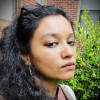
 For all latest news, follow The Daily Star's Google News channel.
For all latest news, follow The Daily Star's Google News channel. 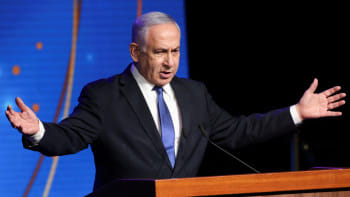
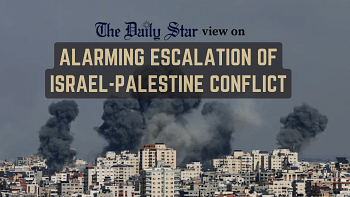
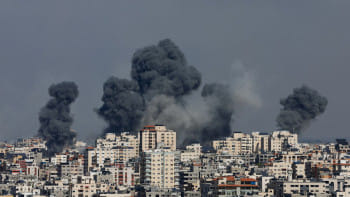






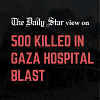


Comments